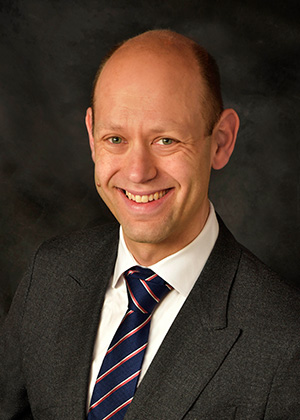
In May, David Shalowitz, MD, MSHP, became a member of the American College of Obstetricians and Gynecologists (ACOG) Board of Directors as a subspecialty representative for the Society of Gynecologic Oncology (SGO).
The appointment, which became official during the ACOG Annual Clinical and Scientific Meeting in San Francisco, gives Dr. Shalowitz, a clinical associate professor in the departments of Obstetrics and Gynecology and Medical Ethics, Humanities, and Law at WMed, the opportunity to be a part of a national organization that is the premiere voice for women’s health care and the promotion of access to high-quality OB/GYN care.
“It’s a huge honor,” Dr. Shalowitz said recently. “I’m privileged to serve and as cancer care specialists, including myself, what we do is an integral part of the continuum of women’s health care. I take that appointment very seriously and I’m looking forward to serving during the next two years.”
As he continues that advocacy at the national level, of equal importance to Dr. Shalowitz is the work he has undertaken since coming to Kalamazoo in 2023 to become the director for Health Equity and Community Outreach at the West Michigan Cancer Center (WMCC) and a faculty member at the medical school.
Over the last year, Dr. Shalowitz admits that the learning curve has been steep as he seeks to serve as a bridge between those delivering health care to cancer patients in Southwest Michigan and those who are studying the delivery of that care. Even more, he is intent, as part of his role at WMCC, on improving access to high-quality clinical care for cancer patients in the region.
“That is my measure of success,” Dr. Shalowitz said. “I believe very firmly that every program has to be deeply sensitive to the nuances of local care delivery and that involves absolutely everything from the social and cultural needs of our patients who need cancer care to the infrastructure of the healthcare delivery system to the needs of the people who are actually delivering the care. I think the greatest challenge, which I take on with great enthusiasm, is to ensure that all stakeholders’ needs are considered as we seek to improve cancer heath equity in our community.”
Although the work ahead of him will be challenging, Dr. Shalowitz said he has hit the ground running and he is encouraged by the commitment from community stakeholders, including leaders at WMCC and WMed. Over the past year, Dr. Shalowitz has been able to garner grant support locally and nationally to implement programs to address disparities in cancer health equity. That grant support from the Kalamazoo Community Foundation and the Ovarian Cancer Research Alliance is supporting initiatives to help improve access and communication between cancer patients, their general practice physicians, and subspecialty cancer clinicians with the use of telemedicine.
“Everyone has been incredibly encouraging and helpful in terms of ensuring access to cancer care and I’ve been very pleased with how collegial everyone has been,” Dr. Shalowitz said. “There is a very clear institutional commitment from WMCC and WMed to health equity and access to care and I’m just really thankful and privileged to take the lead on cancer health equity.”
Prior to coming to Kalamazoo, Dr. Shalowitz spent more than five years as an assistant professor in the Section on Gynecologic Oncology in the Department of Obstetrics and Gynecology at Wake Forest University School of Medicine. While at Wake Forest, he also had a joint appointment as an assistant professor in the Department of Implementation Science.
Dr. Shalowitz is an alumnus of Brown University where he earned a bachelor’s degree in religious studies and biology in 2003. After graduation, he completed a two-year clinical bioethics fellowship at the National Institutes of Health. In 2010, he earned his MD degree at University of Michigan Medical School and went on to complete his OB/GYN residency training at Brigham and Women’s Hospital/Massachusetts General Hospital in Boston.
After residency, Dr. Shalowitz completed a three-year fellowship in gynecologic oncology at the University of Pennsylvania Health System and, at the same time, earned his master’s degree in health policy research.
In making the decision to move to Kalamazoo with his wife and two children, Dr. Shalowitz said he was excited about the “incredible opportunity” to develop the health equity program at WMCC and to be a part of the faculty at WMed.
“I consider it a huge strength that I am able to continue multidisciplinary work through my faculty appointment at WMed and I’m really happy the medical school prioritized a cross-departmental appointment that helps move the health equity agenda forward,” Dr. Shalowitz said.
